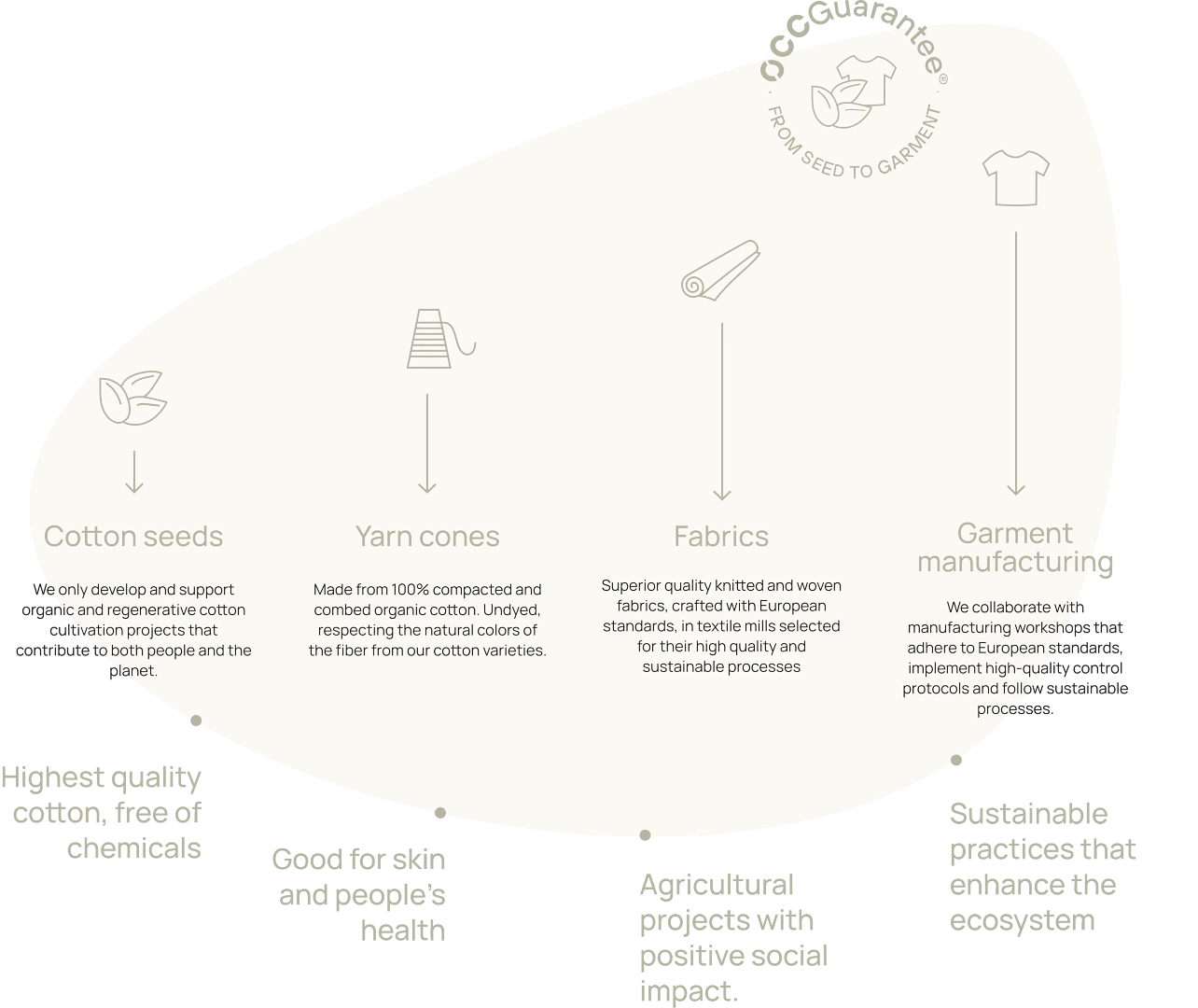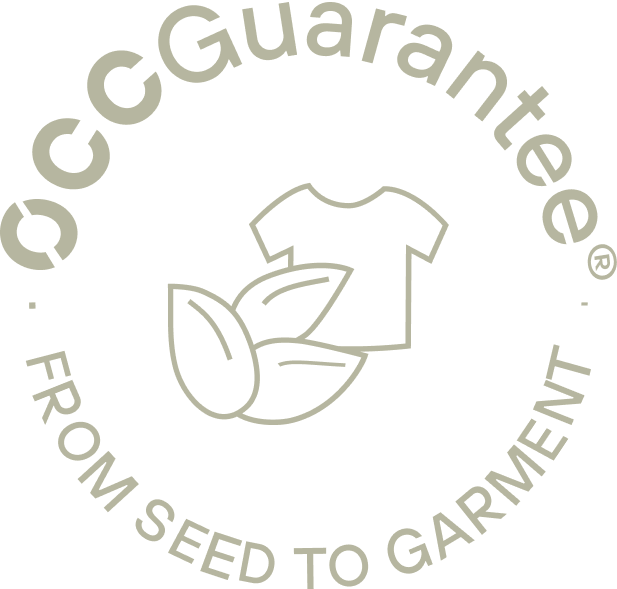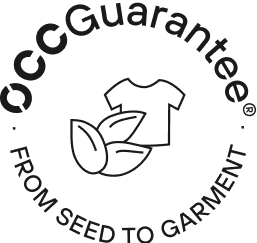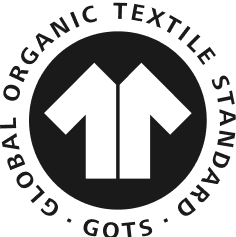Finest organic and regenerative cottons for a better world
Suppliers of 100% organic and regenerative cotton fabrics and garments since 1992.
We grow the world we want
We only develop and support ecological cotton cultivation projects that contribute to both people and the planet.
OCCRegenerative® Brazil
Since 2013, cotton from our own Family Farming agro ecological project has been providing economic security and development to over 200 families of small farmers in north-eastern Brazil.
We organically and regeneratively cultivate various local varieties of Naturally Colorgrown Cotton from the seed, millennia-old varieties of Brazilian cotton that naturally grow in raw, green, and brown tones.
OCCBiodynamic® Egypt
Cotton from SEKEM, a holistic sustainable development project in Egypt that has transformed over 2,500 hectares of desert land into fertile soil. Also known as “the miracle of the desert”. SEKEM is a global reference in biodynamic agriculture methods, a project that provides work and life prospects for more than 20,000 people in Egypt.
We source Pima Egyptian cotton from Giza varieties, considered the world’s best cotton due to its extra-long staples and its natural sheen and silkiness.
OCCRegenerative® Turkey
Discover our range of organic cotton products
OCCGuarantee®
Certification of sustainable cotton with assurance of best practices from seed to garment.
Discover more


Cotton seeds
We only develop and support organic and regenerative cotton cultivation projects that contribute to both people and the planet.
Yarn cones
Made from 100% compacted and combed organic cotton. Undyed, respecting the natural colors of the fiber from our Brazilian, Egyptian, and Turkish cotton varieties.
Fabrics
Superior quality knitted and woven fabrics, crafted with European standards with our yarns, in textile mills carefully selected for their high quality and sustainable industrial processes.
Garment manufacturing
We collaborate with manufacturing workshops and mills that strictly adhere to European standards, implementing high-quality control protocols and sustainable garment production processes.
- Highest quality cotton, free of chemicals
- Good for skin and people's health
- Agricultural projects with positive social impact
- Sustainable practices that enhance the ecosystem
Beyond transactions, we seek partners who share our transformative journey in the textile industry. By promoting the consumption of fabrics and clothing made from organic and regenerative cotton, we invite brands, suppliers, and consumers to actively contribute to creating lasting positive impacts on people, the environment, and farming communities.
Our story and vision
FAQs
What does it mean for cotton to be organic?
Organic cotton is cultivated without the use of pesticides, herbicides, or synthetic chemical fertilizers, also prohibiting genetically modified seeds (GMOs). Focused on soil sustainability and water conservation, it obtains certification through organic standards such as GOTS, EU Organics or USDA Organics, among others, promoting environmentally friendly agricultural and textile practices.
What are the differences between conventional cotton and organic cotton?
Organic cotton differs from conventional cotton due to its sustainable agricultural practices: no pesticides or synthetic chemical fertilizers, no genetically modified seeds, organic certification such as EU Organics or USDA Organics, and promotion of soil health. In contrast, conventional cotton uses genetically modified seeds, pesticides, herbicides, and synthetic chemical fertilizers, which have negative impacts on the health of farmers, soil degradation, biodiversity, and water resources.
Is organic cotton the same as ecological cotton?
In general, both terms are often used interchangeably, but they are different terms. While organic cotton specifically refers to cotton cultivated without genetically modified seeds (GMOs) and without the use of herbicides, pesticides, and synthetic chemical fertilizers, ecological cotton may refer to broader agricultural practices that include reducing overall environmental impacts, such as water conservation and sustainable resource management.
What are the differences between organic cotton and regenerative cotton?
Organic cotton prioritizes agricultural practices without genetically modified seeds (GMOs), herbicides, pesticides, or synthetic chemical fertilizers, with certifications such as EU Organic or USDA Organic. In contrast, regenerative crop cotton is more holistic, prioritizing soil regeneration, agricultural ecosystems, and biodiversity, using practices that include and combine organic cultivation with techniques such as crop rotation, intercropping, mulching, or cover cropping.
Why is a cotton considered sustainable?
Cotton is sustainable when its cultivation and production prioritize environmentally friendly and socially responsible practices. This involves minimal or zero use of herbicides, pesticides, and synthetic chemical fertilizers, the prohibition of genetically modified seeds (GMOs), the promotion of soil and water health, as well as the certification of organic crops, such as EU Organic and USDA Organic, or environmentally and socially sustainable textile transformation practices like GOTS. This approach reduces environmental impact and improves the lives of farmers, contributing to a more equitable and healthy system for both people and the planet.
Latest blog posts
- 1 de March de 2024
OCC and Spoerry 1866 have joined forces to bring to market the exclusive organic and regenerative Brazilian color cotton
OCC and Spoerry 1866 have signed an agreement to consistently market the thread derived from the exclusive organic and regenerative color cotton OCCRegenerative® Brazil. This agreement will not only provide stability to the social project we carry out with Brazilian agricultural communities responsible for cultivating this cotton but also allow for a gradual increase in the number of farmers involved in this project.
- 9 de February de 2024
- Corporative
OCC: A Regenerative Transformation in the Textile Industry
With over 30 years of leadership driven by our commitment to sustainability, environmental regeneration, and social impact, OCC has been pioneers in the production of 100% organic and naturally colored cotton. Today, we celebrate a significant milestone in our evolution by announcing our corporate update.
Brands with our soul











